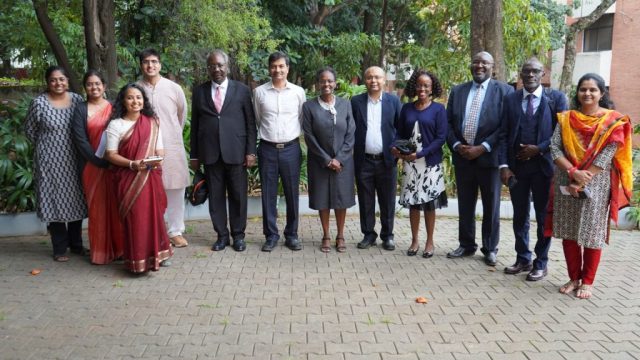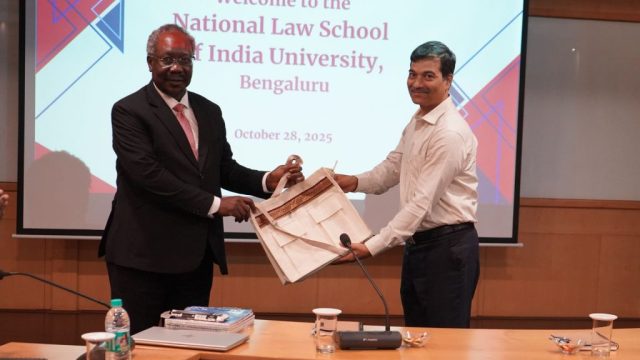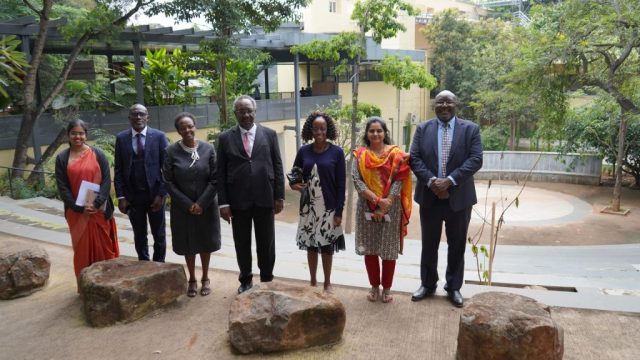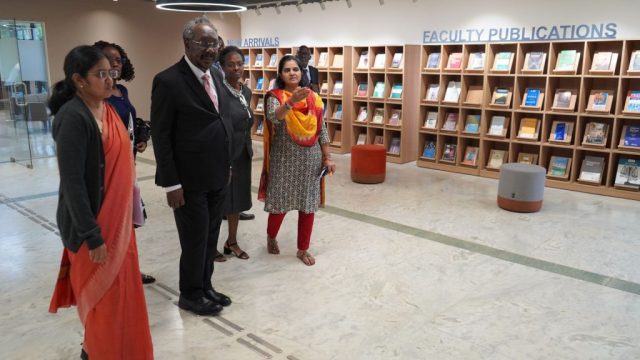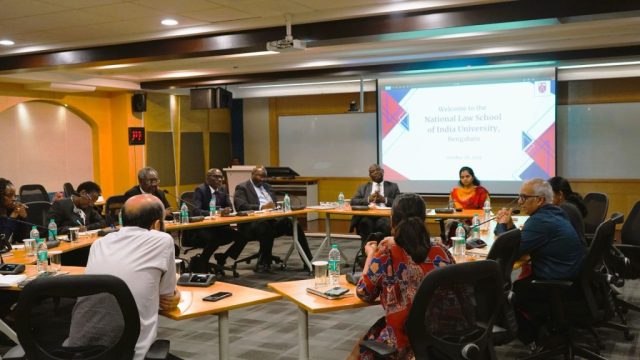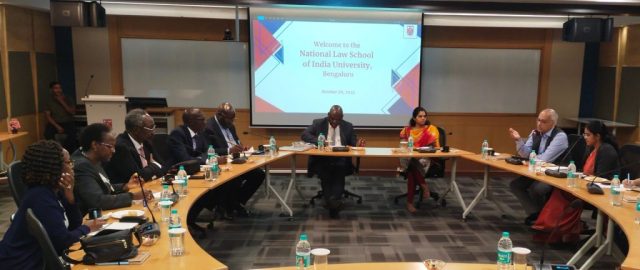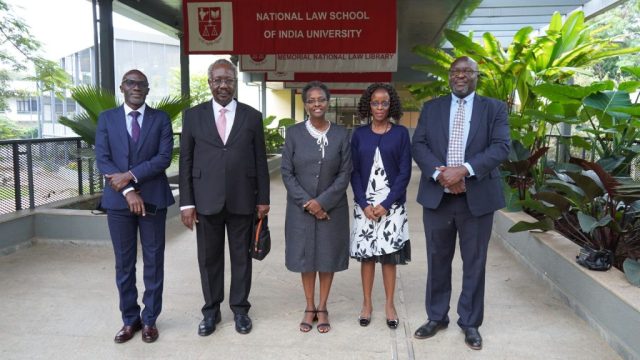Supreme Court Justice Christopher Madrama Leads Ugandan Delegation to NLSIU
October 29, 2025

On October 28, 2025, a six-member delegation from the Law Development Centre (LDC), Uganda, visited the National Law School of India University (NLSIU), Bengaluru. The delegation was led by Hon. Justice Christopher Madrama Izama, Justice of the Supreme Court of Uganda and Chairperson of the LDC, and included LDC members Prof. Ronald Naluwairo, Dr. Pamela Tibihikirra-Kalyegira, Ms. Irene Lugayizi, Mr. John Patrick Adar, and Mr. Hamis Ddungu Lukyamuzi (Secretary).
The delegation, which is in India on a benchmarking study, spent the day on the campus, engaging with various University teams to exchange ideas on legal education and training, and to learn about best practices at NLSIU.
The delegation’s visit primarily focussed on understanding the legal education landscape in India and to gain insights on various programmes and practices which could be applied at LDC. In particular, the Committee was keen to benchmark the curriculum, teaching methods, examination management and infrastructure among other aspects of education. The delegation was welcomed by Ms. Deepti Soni, Director, Communications and External Relations.
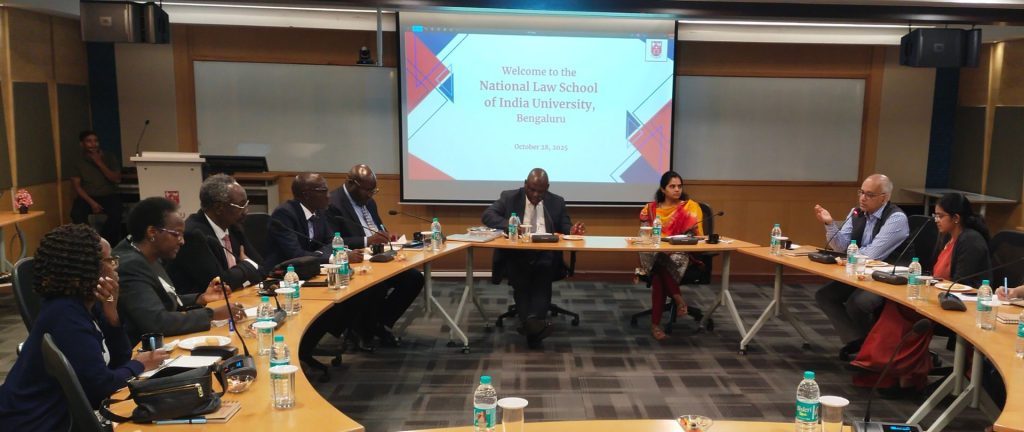 During the first session, NLSIU Registrar-In-Charge Prof. N.S Nigam shared an overview of the University, its history and its journey so far. The delegation later interacted with Dean-Research, Prof. Mrinal Satish, along with Assistant Deans (Research) Siddharth Chauhan and Dr. Debangana Chatterjee to understand the research ecosystem at NLS.
During the first session, NLSIU Registrar-In-Charge Prof. N.S Nigam shared an overview of the University, its history and its journey so far. The delegation later interacted with Dean-Research, Prof. Mrinal Satish, along with Assistant Deans (Research) Siddharth Chauhan and Dr. Debangana Chatterjee to understand the research ecosystem at NLS.
The research team gave an overview of the various research initiatives at the University including its centres, chairs, projects, publications and NLSIU’s fellowship programmes. Through such fellowships, the University hopes to focus on incubating more talent from across Indian universities.
The team also highlighted the growing social science faculty numbers and the expansion in the range of publications put out by the University. They also discussed the editorial processes at the varsity, particularly the scholarship repository, the journals and blogs of NLSIU and the editorial team that handles it all.
The delegation engaged with the team on research grants, regulatory bodies in the higher education system, and research into the efficient use of AI in the current context.
In another session, the delegation met with some members of the Academic Review Committee (ARC) which included Dr. Saurabh Bhattacharjee, Dr. T S Somashekar, Dr. Atreyee Majumder, Dr. Rahul Hemrajani, Dr. Akhila Basalalli, and Dr. Aarti Mundkur. The ARC members shared insights on the pedagogical approach and emphasis on experiential and interdisciplinary learning at the University.
The delegation concluded its visit with a guided campus tour of the University premises.
 Following his visit, Justice Christopher said: “This is my first time in India. I’ve always read about India, its people, languages, and its colonial past. So, when I landed at Bangalore [Bengaluru], I looked out of the window and thought I was coming to an African country because the vegetation, and the terrain looked so familiar. All I didn’t see were the bananas, but I felt quite like coming home.”
Following his visit, Justice Christopher said: “This is my first time in India. I’ve always read about India, its people, languages, and its colonial past. So, when I landed at Bangalore [Bengaluru], I looked out of the window and thought I was coming to an African country because the vegetation, and the terrain looked so familiar. All I didn’t see were the bananas, but I felt quite like coming home.”
Reflecting on his interactions at NLSIU, he said: “At the University, we had a very warm welcome and great learning points between our legal education systems and comparing it to yours here at NLS. The clinical legal education method which is part and parcel of the training in this great institution is sufficient to train lawyers for legal practice. And the course emphasises this approach throughout the learning process for a degree in law. So unlike Uganda where they teach legal doctrine as a first degree in law and then the practical aspects in the bar course, here it’s combined as a one course affair. I believe it’s much more efficient.
“I also learnt that there is a more liberal approach to legal education than in Uganda. I’m amazed by the Indian approach. You have lawyers for all occasions and for villages. I think Uganda has a lot to learn about this attitude so that our policymakers also agree that law is like any other course and those who want to do it should be afforded the opportunity and where they end up should be determined by the market.
With all the liberalisation of legal education, we need to change our attitude. We have come here to learn from India about how to manage bigger numbers, how to ensure integrity of exams, and how to deal with the growing number in terms of pre-entry exams for accredited law schools, and pre-entry for the bar course.”
Through such exchanges, NLSIU hopes to further strengthen global partnerships and open up new avenues for collaboration in legal education and research.


